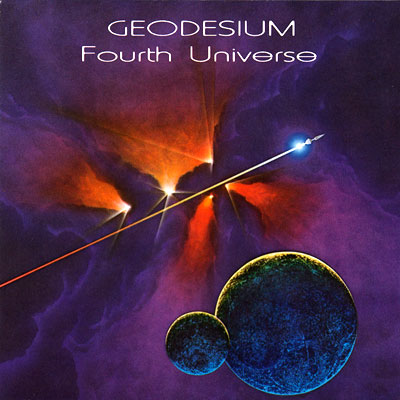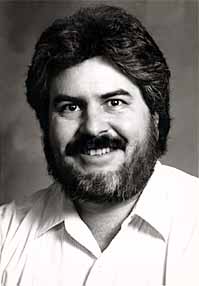

Fourth Universe
Colorado musician describes his fourth album of planetarium space music
Sailing to Neptune, visiting a mysterious seventh planet, cruising around Orion, and exploring the ends of the universe — these are the odysseys that Colorado space music composer Mark C. Petersen conducts for his listeners. They mark the flight path of his audio starship, describe incredible journeys beyond the Earth — aural voyages to infinity. Devotees of space music can find them all on Geodesium Fourth Universe.
According to Mark, all of the pieces on the album were composed as soundtrack music for planetarium shows. The planetarium is the major medium he has composed for over the past 18 years, and he says it is a principal inspiration in his work. "I make my music to be a major part of the planetarium experience. It complements and enhances the visual phenomena we see in the planetarium."
Fourth Universe is — appropriately — Petersen's fourth album, recorded under his musical nom-de-plume Geodesium.
It's a collection of 18 space music compositions created between 1986 and 1991, work that the composer says extends his musical reach and defines the maturity of his sound. "In essence, I'm continuing my explorations of space through music," Mark said of his latest work.
As with his 1990 release, West of the Galaxy, Mark points to his interest in space and astronomy as the inspiration for the diversity of compositions on this latest compilation.
"I like to do space music because it's probably as close as I'll ever get to visiting there. My music can put people in the frame of mind to contemplate the wonders of the universe," he said.
All of the pieces evoke images of space and space travel, but they are hardly the cliché synthesizer pieces created by early space music composers. Mark uses digital sampling keyboards — which often provide acoustic, orchestral and choral sounds — along with the conventional electronic keyboards and synthesizers. The compositions show a variety of influences: rock, jazz improvisation, classic orchestral, as well as the "New Age" sounds that first became popular in the '90s.
Mark is quick to point out that he's been doing his kind of music since before there was a term 'New Age'.
"It's actually somewhat of a misnomer to call this music 'New Age'. It's a convenient label record stores can use, and that's where my albums would be stocked," he said. "But it's not an appropriate terminology. For example, astrology is not astronomy. I find the enormous grandeur of the universe is plenty enough inspiration, without applying any sort of mystical or religious trappings to it. Look, more than a million galaxies have been discovered within the bowl of the Big Dipper. Reality is awesome enough for me!"
From the bright flowing opener, Sailing to Neptune to the emotional yet otherworldly ending piece set on Mars, Rhapsody on a Red Planet, the album takes the listener on a personal tour of the universe.
The stately Moon Without A Name was composed for a program about Neptune and its icy moons. The slow march rhythm and majestic orchestral theme are as haunting as any of the magnificent Voyager 2 images of the system.
Travel With Me beckons to the ear as a bright, up-tempo romp, inviting listeners to traverse the farthest reaches of space. By contrast, The Seventh Planet is a contemplative piece, using a dark orchestral tremolos as a backdrop to a shimmering sequencer melody. It evokes perfectly the cold beauty of the outer solar system.
Closer to Home takes the listener on an aural tour of nearby outer space — the Earth/Moon system. Lush voices, a catchy melody and a bouncy rhythm summon up pictures of the beauty of the home planet and its lunar companion.
Deep Blue explores the depths of a nebula, with rippling harp arpeggios and washes of choral chords. All of the pieces on the album reflect the marriage of orchestral and synthesized sounds that have become the Geodesium trademark.
Throughout his career as a composer and as a planetarian, Mark has worked to define the genre of planetarium space music. His music enhances a new generation of planetarium programs and science center presentations around the world. Chances are, if you've been to a planetarium recently, you've heard Mark's music. More than 900 planetarium facilities in the U.S. and 50 other countries have purchased music or other products from Mark's company, Loch Ness Productions.
Geodesium Fourth Universe is dedicated to the dreamers who guided humanity's first tentative steps to the stars, and to the people who work at planetariums, who faithfully tell the story of humanity's reach for the universe.
Mark says his music is aural science fact and fiction, composed for those who watch the skies and yearn for space flight.
"One might expect that appropriate space music would be some forbidding, somber-sounding stuff," he said. "Yet, I find immense beauty and grandeur in the cosmos, and my music often speaks to that aspect instead. I want my music to touch the listener deeply, to transport someone from the Earth to anywhere in the universe, or inspire them to look up at the stars and dream."


